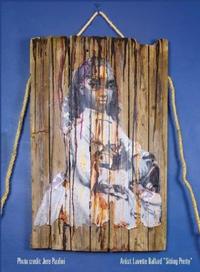Often when we think of "urgent care" we think about the medical drop-in facilities that have opened up in recent years, bridging the gap between primary-care offices and emergency rooms. But what does urgent care mean in a more societal context? What does it mean for women of color dealing with internal and external trauma, triggers, and viral videos of people who look like us being killed and terrorized, all the while trying to care for others, let alone ourselves? What does our urgent care look like?
The Colored Girls Museum (TCGM)—a memoir museum that honors the stories, experiences, and history of colored girls—seeks to answer, or at least acknowledge, these questions. Last Thursday, Jefferson University hosted a discussion about the museum's special exhibition Urgent Care: A Social Care Experience, as part of this year's One Book, One Philadelphia season.
As Vashti DuBois, founder and executive director of The Colored Girls Museum, and curator Michael Clemmons presented the context for their exhibition, I found myself unsurprised by the statistics, yet fascinated: A large PowerPoint explained that, for instance, black women are most affected by things such as heart disease and even pregnancy- and childbirth-related death. This struck a chord; just last week, tennis star Serena Williams, who has a history of blood clots, revealed that after she gave birth she had to become her own advocate and convince her doctors to treat her when something didn’t feel quite right. For those who don’t have that access, knowledge of their own medical histories, or even self-efficacy skills, what chance do they have? These thoughts raised larger concerns about my own health and what I am doing for self-care, and how I advocate for myself in times of stress or sickness. As someone who has been plagued with migraines for years, I have become my own expert on what to do during an episode. But am I doing enough to prevent them altogether? Is medicating the problem enough or even the right solution? What if my problem is less environmental and more emotional? Ugh, where do I start?
As much as One Book, One Philadelphia is meant to spark community conversation, learning about The Colored Girls Museum and the issues it highlights sparked an internal dialogue for me of questions ... and more questions.
The Colored Girls Museum is incredibly radical and amazing—but an even bigger takeaway was that we often have to be the arbiters of our own destinies. This is a message echoed in Jacqueline Woodson’s Another Brooklyn, as narrator August must learn to fend for herself while also defining herself as separate from her group of dear childhood friends. And sometimes, we don’t feel empowered or supported enough to do so—it’s also so important to have a village, a community of people who understand our past and acknowledge our present, to help us secure a stable future.
This is why people like Vashti and Michael, and Woodson, are so important. Urgent Care: A Social Care Experience holds up a mirror to us, to our whole society, showing us things we desperately need to see.
**Check back every #OneBookWednesday during the season for some more One Book food-for-thought! For a full list of events, visit our online calendar.**
Have a question for Free Library staff? Please submit it to our Ask a Librarian page and receive a response within two business days.

